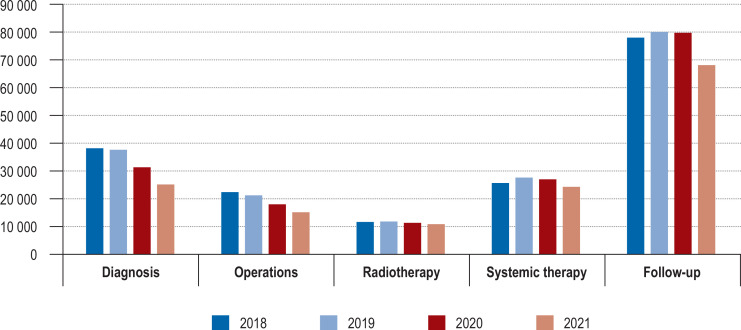The coronavirus disease 2019 (COVID-19) pandemic has led to a decline in cancer diagnoses worldwide, as shown by data from Germany as well as from international studies (1, 2). However, the question of whether this is also true for therapies and follow-up examinations has remained largely unanswered. Obtaining a clear and comprehensive statement about this is currently of great interest. This applies in particular to the questions about the extent to which patient care was restricted due to the pandemic, and about what patients and doctors can expect in terms of pending treatments in the coming months and years.
Cancer registries offer a unique source of comprehensive data that can be used to address and answer these questions. For this reason, we used the registration data from the Cancer Registry Rhineland-Palatinate gGmbH to analyze cancer-related reports prior to and during the pandemic.
Acknowledgments
Translated from the original German by Veronica A. Raker, PhD.
Footnotes
Conflict of interest statement The authors declare that no conflict of interest exists.
Methods
Cancer registration in Rhineland-Palatinate originally started in 1997, based on purely epidemiological data (3). Since January 1, 2016, clinical cancer data are also collected and processed. By comparing with the expected values from external sources, such as the German Centre for Cancer Registry Data at the Robert Koch Institute, diagnosis and therapy data were found to reach a completeness of at least 90% after about a year. Based on this dataset, the reported numbers for the years 2018 and 2019 were compared with the pandemic years 2020 and 2021 for the evaluations presented here (data acquisition: July 1, 2022). All analyses are based on the ‘R’ programming language in RStudio (IDE) (4).
Results
We observed an 8% reduction in the number of reports on diagnoses and operations in 2020 (figure). In contrast, we found almost no differences in the number of reports on systemic therapy and radiotherapy as compared to the previous years (figure). Likewise, we observed no differences in the number of reports on follow-up examinations as compared to the previous years (figure). For 2021, we observed significantly greater reductions in the number of reports, and in particular of those concerning diagnoses, operations, and follow-up examinations, than in 2020. However, a possible delay in reporting must still be taken into account for 2021.
Figure.
Number of reports per reporting reason and year that were received by the Cancer Registry Rhineland-Palatinate. The pre-pandemic years 2018 and 2019 are compared with the pandemic years 2020 and 2021.
Discussion
Our evaluation of the cancer registry data suggests that there were reduced numbers of cancer diagnoses, and of the subsequent cancer-related operations, in Rhineland-Palatinate due to the pandemic.
In contrast, systemic and radiation therapies, as well as follow-up examinations, appear to have been able to continue unaffected by the pandemic. This difference may be based on the fact that hospitals were at capacity due to COVID-19. In turn, the practice-based care, in which systemic therapy, radiotherapy, and follow-up examinations mainly take place, was significantly less affected by a pandemic-related reduction.
This first insight into the overall situation in Rhineland-Palatinate is based on the number of reports received by the cancer registry. The numbers for 2021 have to be considered with reservation, as reporting delays of up to one year are possible, and especially given the limited capacities during the pandemic.
The results of our analyses support the assumption that there may be an increased number of cancer diagnoses in the next few years, with an increased proportion of advanced tumors (5). The evaluations also indicate that all diagnosed tumors were treated without major restrictions despite the pandemic.
Our analyses refer to the general incoming reports, making an overview of all types of cancer possible. Evaluations of individual tumor entities will be carried out in the future.
References
- 1.Jacob L, Loosen SH, Kalder M, Luedde T, Roderburg C, Kostev K. Impact of the COVID-19 pandemic on cancer diagnoses in general and specialized practices in Germany. Cancers (Basel) 2021;13 doi: 10.3390/cancers13030408. [DOI] [PMC free article] [PubMed] [Google Scholar]
- 2.Englum BR, Prasad NK, Lake RE, et al. Impact of the COVID-19 pandemic on diagnosis of new cancers: a national multicenter study of the veterans affairs healthcare system. Cancer. 2022;128:1048–1056. doi: 10.1002/cncr.34011. [DOI] [PMC free article] [PubMed] [Google Scholar]
- 3.Krebsregister Rheinland-Pfalz gGmbH. Was wir tun. 202. www.krebsregister-rlp.de/ueber-uns/was-wir-tun/ (last accessed on 12 September 2022) [Google Scholar]
- 4.R Studio Team. Integrated development for R: RStudio, Boston, MA, USA 2020. www.rstudio.com/ (last accessed on 8 September 2022) [Google Scholar]
- 5.Guven DZ, Sahin TK, Yildirim HC, et al. Newly diagnosed cancer and the COVID-19 pandemic: tumour stage migration and higher early mortality. BMJ Support Palliat Care. 2021 doi: 10.1136/bmjspcare-2021-003301. bmjspcare-2021-003301. [DOI] [PubMed] [Google Scholar]



